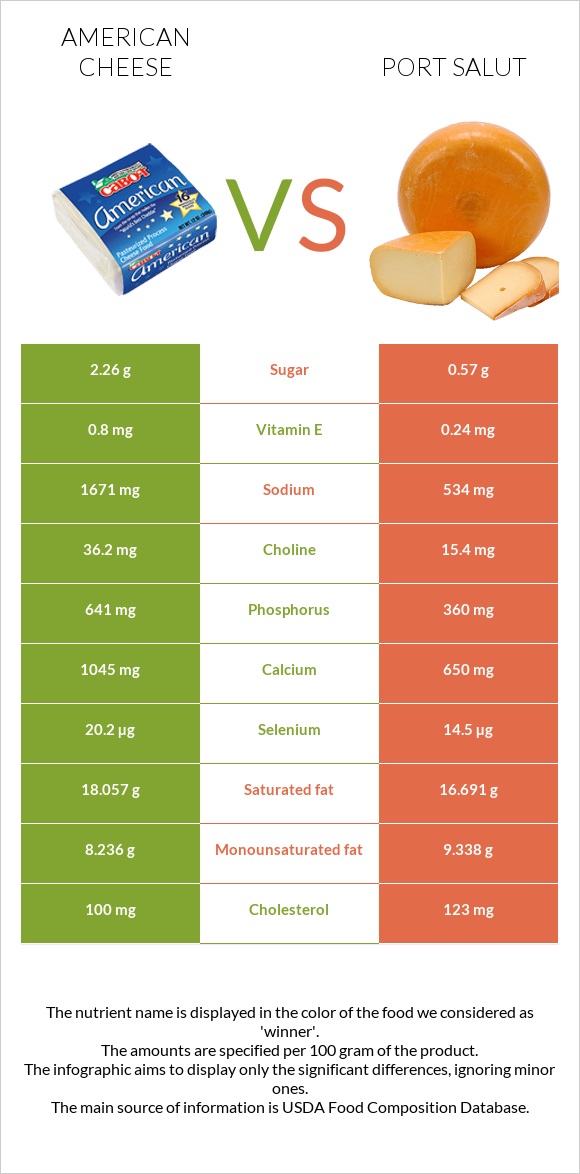American cheese vs. Port Salut — In-Depth Nutrition Comparison
Compare
What are the differences between American cheese and port Salut?
- American cheese is higher in phosphorus, calcium, and selenium, yet port Salut is higher in monounsaturated fat.
- American cheese's daily need coverage for sodium is 49% more.
- American cheese has 4 times more sugar than port Salut. While American cheese has 2.26g of sugar, port Salut has only 0.57g.
We used Cheese, pasteurized process, American, without added vitamin D and Cheese, port de salut types in this article.
Infographic

Infographic link
Mineral Comparison
Mineral comparison score is based on the number of minerals by which one or the other food is richer. The "coverage" charts below show how much of the daily needs can be covered by 300 grams of the food.
| Contains more CalciumCalcium | +60.8% |
| Contains more IronIron | +46.5% |
| Contains more CopperCopper | +109.1% |
| Contains more PhosphorusPhosphorus | +78.1% |
| Contains more ManganeseManganese | +272.7% |
| Contains more SeleniumSelenium | +39.3% |
| Contains less SodiumSodium | -68% |
Vitamin Comparison
Vitamin comparison score is based on the number of vitamins by which one or the other food is richer. The "coverage" charts below show how much of the daily needs can be covered by 300 grams of the food.
| Contains more Vitamin EVitamin E | +233.3% |
| Contains more Vitamin DVitamin D | +20% |
| Contains more Vitamin B3Vitamin B3 | +26.7% |
| Contains more Vitamin B5Vitamin B5 | +91.9% |
| Contains more Vitamin AVitamin A | +26% |
| Contains more FolateFolate | +125% |
All nutrients comparison - raw data values
| Nutrient |  |
 |
DV% diff. |
| Sodium | 1671mg | 534mg | 49% |
| Calcium | 1045mg | 650mg | 40% |
| Phosphorus | 641mg | 360mg | 40% |
| Protein | 18.13g | 23.78g | 11% |
| Selenium | 20.2µg | 14.5µg | 10% |
| Cholesterol | 100mg | 123mg | 8% |
| Vitamin A | 250µg | 315µg | 7% |
| Fats | 31.79g | 28.2g | 6% |
| Saturated fat | 18.057g | 16.691g | 6% |
| Vitamin E | 0.8mg | 0.24mg | 4% |
| Vitamin B5 | 0.403mg | 0.21mg | 4% |
| Choline | 36.2mg | 15.4mg | 4% |
| Polyunsaturated fat | 1.286g | 0.729g | 4% |
| Iron | 0.63mg | 0.43mg | 3% |
| Copper | 0.046mg | 0.022mg | 3% |
| Folate | 8µg | 18µg | 3% |
| Monounsaturated fat | 8.236g | 9.338g | 3% |
| Calories | 371kcal | 352kcal | 1% |
| Carbs | 3.7g | 0.57g | 1% |
| Zinc | 2.49mg | 2.6mg | 1% |
| Vitamin D | 0.6µg | 0.5µg | 1% |
| Manganese | 0.041mg | 0.011mg | 1% |
| Net carbs | 3.7g | 0.57g | N/A |
| Vitamin D | 23 IU | 21 IU | 0% |
| Magnesium | 26mg | 24mg | 0% |
| Potassium | 132mg | 136mg | 0% |
| Sugar | 2.26g | 0.57g | N/A |
| Vitamin B1 | 0.015mg | 0.014mg | 0% |
| Vitamin B2 | 0.234mg | 0.24mg | 0% |
| Vitamin B3 | 0.076mg | 0.06mg | 0% |
| Vitamin B6 | 0.054mg | 0.053mg | 0% |
| Vitamin B12 | 1.5µg | 1.5µg | 0% |
| Vitamin K | 2.6µg | 2.4µg | 0% |
| Trans fat | 1.144g | N/A | |
| Tryptophan | 0.232mg | 0.343mg | 0% |
| Threonine | 0.772mg | 0.876mg | 0% |
| Isoleucine | 0.938mg | 1.446mg | 0% |
| Leucine | 1.716mg | 2.482mg | 0% |
| Lysine | 1.516mg | 1.987mg | 0% |
| Methionine | 0.475mg | 0.734mg | 0% |
| Phenylalanine | 0.939mg | 1.323mg | 0% |
| Valine | 1.187mg | 1.707mg | 0% |
| Histidine | 0.546mg | 0.686mg | 0% |
| Omega-3 - EPA | 0.012g | 0g | N/A |
| Omega-3 - DHA | 0.006g | 0g | N/A |
| Omega-3 - ALA | 0.137g | N/A | |
| Omega-3 - DPA | 0.021g | 0g | N/A |
| Omega-3 - Eicosatrienoic acid | 0.001g | N/A | |
| Omega-6 - Gamma-linoleic acid | 0.001g | N/A | |
| Omega-6 - Dihomo-gamma-linoleic acid | 0.033g | N/A | |
| Omega-6 - Eicosadienoic acid | 0.009g | N/A | |
| Omega-6 - Linoleic acid | 0.79g | N/A |
Macronutrient Comparison
Macronutrient breakdown side-by-side comparison
Protein:
18.13 g
Fats:
31.79 g
Carbs:
3.7 g
Water:
39.61 g
Other:
6.77 g
Protein:
23.78 g
Fats:
28.2 g
Carbs:
0.57 g
Water:
45.45 g
Other:
2 g
| Contains more FatsFats | +12.7% |
| Contains more CarbsCarbs | +549.1% |
| Contains more OtherOther | +238.5% |
| Contains more ProteinProtein | +31.2% |
| Contains more WaterWater | +14.7% |
Fat Type Comparison
Fat type breakdown side-by-side comparison
Saturated fat:
Sat. Fat
18.057 g
Monounsaturated fat:
Mono. Fat
8.236 g
Polyunsaturated fat:
Poly. Fat
1.286 g
Saturated fat:
Sat. Fat
16.691 g
Monounsaturated fat:
Mono. Fat
9.338 g
Polyunsaturated fat:
Poly. Fat
0.729 g
| Contains more Poly. FatPolyunsaturated fat | +76.4% |
| Contains more Mono. FatMonounsaturated fat | +13.4% |
~equal in
Saturated fat
~16.691g





